The Lost Art of Giving Back
From CCNY to Joe Manchin--a Sad Regression
By Frank Van Riper
Photography Columnist
The New York Times ran a feel-good story the other day about my old alma mater, CCNY—The City College of New York.
An anonymous donor had given CCNY’s Physics Department a gift outright of $180,000.
In cash.
It came in bank-wrapped 50s and 100s and had been sent in a cardboard box via US Mail, postmarked Nov. 10, 2020. The package remained unclaimed in the College’s mail room because the “Chairman, Physics Department”—to whom it was addressed--had not been on campus for months, having been forced to, among other things, teach remotely because of Covid.
“Assuming that you are [a] bit curious as to why I am doing this, the reason is straightforward,” wrote the donor, in an unsigned note that was read after the package finally had been opened by Prof. Vinod Menon, chairman of the CCNY’s Physics Department.
“Long ago,” the donor explained, he (or she) took advantage of the “excellent educational opportunity” of attending both Stuyvesant High School, and later earning a bachelor’s and master’s degrees in physics at City College, which helped lead to “a long, productive, immensely rewarding” scientific career.
 |
| A most unusual gift. This box, containing $180,000 in cash was sent to the CCNY Physics Dept. last year by an anonymous former student who wanted to pay it forward after his (or her) very successful career as a scientist. (CCNY photo) |
And now she (or he) was giving back. After first determining through federal authorities that the money was not proceeds from a crime, the College gratefully—even gleefully—accepted it. It’s estimated that the anonymous $180 grand will fund two full tuition scholarships in Physics at CCNY each year for at least the next decade.
This unusual story of altruistic payback (and paying forward) resonated with me as this country wrestles, not just with funding social policies that other, more civilized, societies take for granted, but also as we strive to preserve the very essence of our democracy in the post-Trump era.
It brought home to me again how far we have fallen from the simple concept—a foundation, really, of many religions—that looking out for others also is a way to take care of ourselves.
And no, this is not all Trump’s fault; it started much, much earlier.
When my alma mater was founded back in 1847, it was known as the Free Academy of New York and it was a dramatic social experiment to see what would happen if free quality higher education were provided to New York’s poorer classes. Over the ensuing decades the school became The City College and, later still, the multi-college City University of New York (CUNY). It became famous for providing a first-rate and tuition-free college education to qualified, mostly lower income, New York area students. Not for nothing was my old school once described as “kind of a proletarian Harvard.”
It turned out that providing free college education to low income but highly motivated students was a sound investment. Over the years CCNY graduates have included such luminaries at Jonas Salk, Paddy Chayefsky, Bernard Malamud, Colin Powell, Felix Frankfurter, Deborah Lipstadt, Kenneth Clark, Oscar Hijuelos, “Yip” Harburg, Edward G. Robinson, Zero Mostel, Upton Sinclair, and Alfred Stieglitz—not to mention ten Nobel Laureates (as of this writing.)
The free tuition ride lasted until the mid-1960s. I was a student at CCNY and editor-in-chief of the college’s oldest undergraduate newspaper, The Campus, when the Board of Higher Education in New York, forced by economics, voted to impose tuition throughout the venerable City University system--$400 a year. (After more than 50 years, the current annual tuition at CCNY has increased to $7100. That’s a lot more than $400, but still a fraction of what it costs to go to the ‘other’ Harvard at $47,730 annually.)
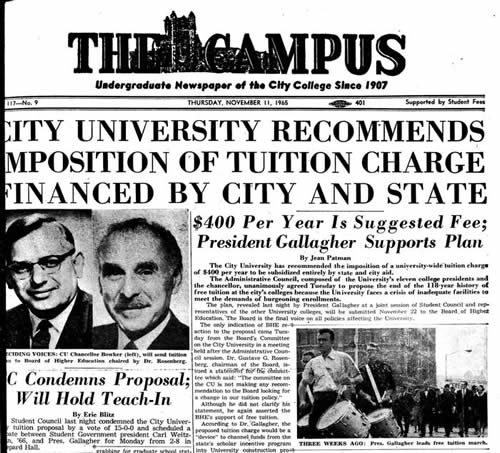 |
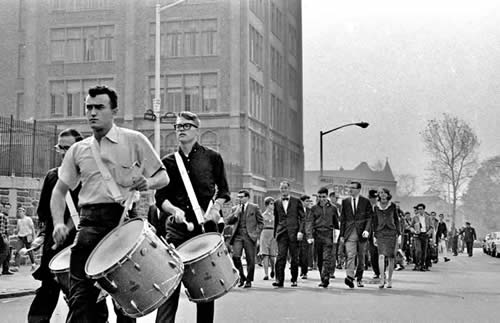 |
| It was probably the most portentous frontpage headline of my college newspaper career: literally the end of an era. In bottom photo, CCNY students and faculty, led by College president Buell Gordon Gallagher (center in bowtie) march on campus to protest the end of free tuition at the City University. Bottom photo: Frank Van Riper |
Still, to an idealistic student editor getting a free college education in the mid-1960s, the shock of seeing the “Free Academy” die stung.
“Principle, we hope, is not dead,” I wrote in The Campus’ lead editorial shortly after the Board of Higher Education voted. “It is the thing of which dreams are made. And, up until this week, it was the thing on which this university stood—a university which for the past 118 years has opened its doors to all regardless of race, creed or ability to pay…”
“Education is a right which must never become a privilege,” I went on. “Free tuition is our only real insurance that this right will never be taken away…”
I believed that then and I believe it now. Just as I believe the principle so often touted by one of my first political heroes, the late Democratic vice president Hubert H. Humphrey of Minnesota: that a society is measured by how it treats its least fortunate both here and abroad.
Ignored and ridiculed during the Trump years, this concept of caring for others actually started to erode long before. We strode the world as a colossus after World War 2, helping to rebuild a world rent by German Fascism and Japanese imperialism—treating even former enemies with respect. But as my friend and former photographic mentor Neil Selkirk, a native Brit, now a New Yorker, observed in the aftermath of 9/11:
"I noticed that US aid seemed to be more and more often distributed in the form of loans rather than outright gifts or medical, educational, or agricultural programs…I then watched the loans turn bad and the recipients turn in our minds into deadbeats...."
"Just as my childhood pride was crushed as I had watched in dismay as the British economy was overtaken by the other European countries, so I died a little each time I saw my adopted country slide incrementally towards the bottom of the list of foreign aid givers. It seemed that we had given up spreading our unique brand of joy and knowledge. The chairmen of the Senate Foreign Relations Committee were no longer world leaders in their own right. In fact, they became the opposite, minor figures, symbols of our national regression."
As I noted at the time: Parse the transition from anti-Vietnam war Democrat (and Foreign Relations Committee chairman) Sen. J. William Fulbright to ultra-rightwing Republican Sen. Jesse Helms, his successor as chairman two decades later, and you see what Neil was talking about.
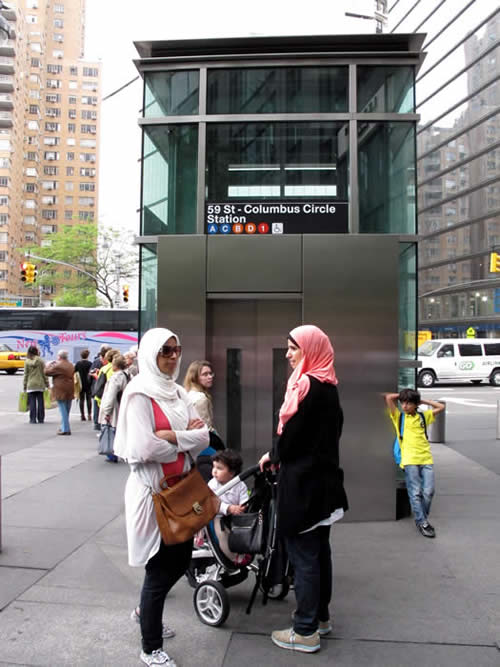 |
| A different city now, and, one can argue, a stronger one for its diversity. At Columbus Circle in Manhattan, Muslim women wait for the subway elevator. My guess is that they are trying to make a life here just as my mother's Italian parents did shortly after their arrival in America after the turn of the 20th century. (Frank Van Riper) |
And it only got worse thanks to a rogue's gallery of wretched Republicans and segregationist Democrats.
Years earlier, Republican Richard Nixon helped pave the way for demagogues like Wisconsin Republican Sen. Joseph McCarthy to destroy lives and careers in his anti-communist witch hunts of the 1950s—aided in no small part by the venomous Roy Cohn (who one day would be Donald Trump’s consigliere before he died of AIDS in 1986 at age 59.)
Years later, that same Nixon would craft his “Southern Strategy” of the late 1960s to build on the racism of the Democratic segs to dog-whistle what only could be seen as a racist attempt to bring the white Democratic South into the GOP fold. He would be followed in later years by other ideologues like Newt Gingrich, who liked to couch his disdain for the poor in highfalutin academic rhetoric, to wit his “Contract with America.”
It should not surprise, then, that the black soil of white privilege would spawn something as abhorrent as Donald Trump, aided in congress by an appalling group of enablers and sycophants led by Mitch McConnell and Kevin McCarthy.
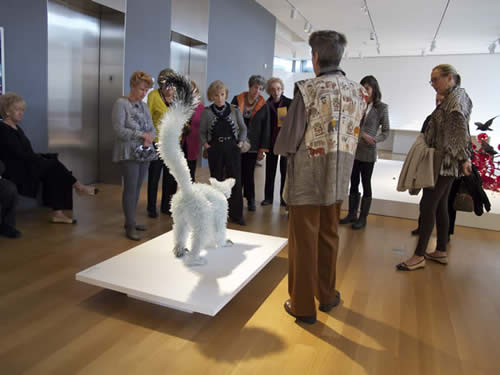 |
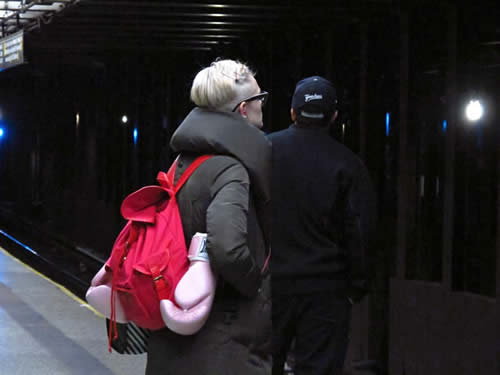 |
| I grew up in a city that not only never sleeps, but that caters to all kinds. Museum goers in midtowm; waiting for the subway with pink boxing gloves. (Frank Van Riper) |
I know I am painting in broad strokes, but I believe America prospers when it lifts everyone up, not just the rich or privileged. And I also believe it is no accident that the best of these times occurred under Democrats: The FDR New Deal (Social Security, WPA, etc,); Lyndon B. Johnson’s Great Society (Medicare, Medicaid); Barack Obama’s Obamacare, and now Joe Biden's Infrastructure/Build Back Better plan.
I have been known to scream at the TV when Maserati-driving West Virginia millionaire Joe Manchin (ostensibly a Democrat) threatens to bollox the president’s massive program by saying on Fox News, of all places, that, nope, he just can’t bring himself to fund the project, despite the tangible benefits BBB will bring to his impoverished home state. (A New York Times analysis of Manchin’s supposed economic reservations about the bill’s price tag found them to be largely “wrong.”)
The White House, responding with uncharacteristic bluntness to Manchin’s bombshell, in effect cut the reluctant Democrat a new orifice.
At this writing one hopes that all this is Kabuki-dancing before both the White House and Manchin agree on a package that will persuade him to vote with the razor-thin Senate Democratic majority and pass a legislative package the likes of which we have not seen since The New Deal.
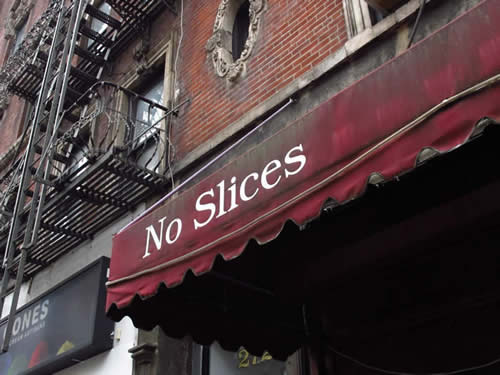 |
| In essence the White House is trying not to be nickel-and-dimed by false friends like Joe Manchin. The country needs the whole pie, the President says, to undo decades of neglect. (Frank Van Riper) |
At this stage—and after four years of the worst president in American history—it is what we desperately need: a program that renews faith in all people, regenerates our infrastructure, creates real jobs and gives those who can least afford it opportunity.
That opportunity was mine decades ago and I never forget the greatness of that gift. My mother, the former Carmela Casullo, never graduated high school. My father, Al Van Riper, never made it to college. I grew up happily in the Bronx, in a series of walk-up apartments in lower middle class, largely Jewish, neighborhoods. Each of my parents was determined that I get a better shot in life than they had, but mom made it plain that they could not afford to send me to a tuition-charging college. It was CCNY or nothing.
How different my life would have been without City College. Decades later as a working photographer, covering an event in Washington featuring Colin Powell (CCNY, 1958), the former Secretary of State and I wound up in an elevator together. I held up my hand to show him my ring.
“CCNY ’67,” I said. His smile lit up the elevator. We each had received the gift and each of us appreciated how valuable it had been.
 |
| Here's to a New Year of Healing, Health and Hope--for all of us...FVR |
-0-0-0-0-0-
Lubec Photo Workshops at SummerKeys, Lubec, Maine

Join us for another magical summer in Down East Maine in 2022--registration now is open...
Master Photo Classes with Frank Van Riper
These intense, three and a half-day, limited enrollment classes are aimed at the more advanced student, who already has taken a photo workshop and who is familiar with basic flash. Maximum enrollment of just five. Open to vaccinated students ONLY. Enrollment through the famed SummerKeys Music and Arts workshops in Lubec, Maine--the easternmost point in the United States. NB: previous Master Classes were fully booked almost immediately.
2022 Master Photo Class dates:
July 19th-20th (final critique on the 21st)
August 1st-3rd (final critique on the 4th
More Information: GVR@GVRphoto.com
To enroll: www.SummerKeys.com
Come photograph in one of the most beautiful spots on earth.
-----------
Van Riper Named to Communications Hall of Fame
 |
| Frank Van Riper addresses CCNY Communications Alumni at National Arts Club in Manhattan after induction into Communications Alumni Hall of Fame, May 2011. (c) Judith Goodman |
[Copyright Frank Van Riper. All Rights Reserved. Published 12/23/21]
|